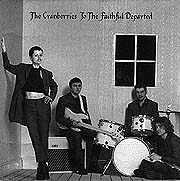








Nobody can repeat a single vocal sound over and over again with as much effect as the Cranberries's Dolores O'Riordan. Even though their third effort, To The Faithful Departed , is produced by Bruce Fairburn - of mainstream, hard-rocking Bon Jovi fame - O'Riordan loses little if any of the singular effect of her howling, cooing, growling voice. She infuses even what could not be properly called "words" with the extremes of sentimentality that characterize the themes of the new album. As for "the Other Cranberries," guitarist Noel Hogan, drummer Fergal Lawler and bassist Mike Hogan, they are good, but merely an afterthought.

The album is entitled To The Faithful Departed and accordingly, it turns a mournful glance toward those who have died - including Kurt Cobain, John F. Kennedy, John Lennon - but beyond this, the album also addresses the memory of moments that have died, and the suffering of those left behind on earth. Perhaps the use of pure sound actually expresses these themes better than the trite, coyly naïve words and schoolgirl philosophy that sometimes accompany them. The first song of the album says, "This is not Hollywood like I understood. Run away-ay-ay-ay," and indeed, the album reflects the voice of someone who has been cruelly tricked into believing that things can be simple and good if only. . . .
The fact that the world is neither simple nor good, especially for children - as realized in "War Child" and "Bosnia," among others - seems to be incomprehensibly sad to the singer and leaves her to resort to helpless pleas for justice and overwhelming sentimentality. In "Bosnia" she sings, "I would like to state my vision; life was so unfair. Surely things would change if we really wanted them to. Fear for children. . . There was terror in their heads. . . . When do the saints go marching in?" and is promptly joined by a chorus of children chanting along in marching rhythm. The song, which ends the album, concludes with the fading notes of a music box playing a lullaby. This particular element is somewhat akin to being hit over the head with the message: remember the innocence of children, which is destroyed by the cruel realities of war.
The naïveté of such lyrics and musical manipulations are without a doubt melodramatic to anyone who has already realized that life is unfair and has ceased to believe that fixing that injustice can be as easy as wishing it away. Nevertheless, looking past the resentment one might feel at having one's emotions controlled by such blatantly sentimental tactics as lullabies and children's voices, the central figure of the child as a trope for injustice and innocent suffering is profoundly effective, and O'Riordan's voice makes it difficult to believe that her sentiment and innocence is anything but genuine.
The album uses various musical and extra-musical gestures, such as the music box on "Bosnia," and at times, the elements work very well. For instance, the five gun shots that end "I Just Shot John Lennon" are an interesting twist to an odd song. But even more effective to that song's purposes is the church-like funeral dirge that marks the beginning of the song which follows "I Just Shot John Lennon." This next song, "Electric Blue" embodies the lovely, sorrowful calm of a funeral - complete with church bells tolling in the background and Latin lyrics - after the noise, confusion and commotion of the assassination.
Once again, on "Will You Remember?" the dizzying, whirling sounds of circus music compliment the touchingly naïve lyrics, "I won't remember the dress that I wore. I won't remember champagne. I won't remember the things that we swore, I will just love you in vain." The simplicity and coy, child-like innocence work very well on more personal songs about love and marriage, memory and children but when it comes to more complex issues of war and drug abuse the simplicity just becomes blindness. Perhaps the most sublimely ridiculous lines the simplistic outlook produces are, "To all those people doin' lines, don't do it. Don't do it. Inject your soul with liberty. It's free It's free. . . . Salvation, salvation, salvation is free."
The album is most successful when it offers some element of surprise. Though its innocence can be charming, it can also be frustrating. The song "Forever Yellow Skies" presents a moment in which all the simplicity and altruistic love that goes into many of the other songs gets completely turned around. O'Riordan sweetly, innocently sings, "Forever, forever I'll be, forever holding you, hoo, hoo," and then artfully redefines the line by adding a single word: "Forever, forever I'll be, forever holding you responsible, responsible, responsible," which degrades into a growl.
This song recalls the verbal twist that occurs in "Ridiculous Thoughts," from the Cranberries' release No Need To Argue . Here, throughout the song, O'Riordan sings, "But you're gonna have to hold on, hold on. We're gonna have to move on, move on," implying essentially "It's over." Then, at the end of the song, she changes the meaning completely with the additional of a few words: "But you're gonna have to hold on. You're gonna have to hold on to me-e-e-e." The redefinition that takes place on the new album shows a turn from trusting weakness to accusatory strength whereas on the previous album, the inversion was the opposite, from strength to weakness.
This strength of will however is certainly not charateristic of the album in general and appropriately so, because it is not an angry album. It is sad and simple, and its suffering is the quiet suffering of a child who does not understand enough to know rage.

Copyright © 1996, The Oberlin Review.
Volume 124, Number 24; May 10, 1996
Contact Review webmaster with suggestions or comments at ocreview@www.oberlin.edu.
Contact Review editorial staff at oreview@oberlin.edu.